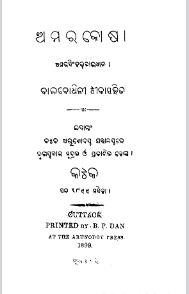The Namalinganushasanam, a thesaurus in Sanskrit authored by the ancient Indian scholar Amarasimha, is more often known as the Amarakosha. The Sanskrit terms amara (“immortal”) and kosha (“treasure, casket, pail, collection, dictionary”) are the source of the name Amarakosha.This Sanskrit lexicon (kosha), according to Arthur Ba Keith, is one of the oldest ones still in existence. Keith claims that Amarasiha, who may have lived in the sixth century, “knew the Mahayana and used Kalidasa.”18 earlier works that the author himself acknowledges are all gone. The Amarakosha has been the subject of more than 40 critiques.Verse fragments from the Amarakoa are simple to memorise. There are three kas, or chapters, in it. The first chapter, svargadi-kaa (“heaven and others”), has passages that discuss heaven and the Gods and other heavenly creatures that live there.
The first kaa of the Amarakoa, Svargadikaa, opens with the lyric “Svar-avyaya-Svarga-Naka-Tridiva-Tridasalaya,” which lists other names for Heaven, including Sva, Svarga, Nka, Tridiva, and Tridalaya. In the second stanza, “Amar Nirjar DevsTrida Vibudh Sur,” several terms used to refer to the Deva-s (Gods) are described. The names of Buddha and Kyamuni (also known as Gautam Buddha) are described in the fifth and sixth verses. The names of Brahm, Viu, Vasudeva, Balarma, Kmadeva, Lakmi, Ka, Ia, Indra, etc. are given in the following lines. All of these names are held in the highest regard. Although Amarasiha is said to have been a Bauddha (Buddhist), Amarakoa depicts a time before sectarian tensions began to grow. Buddhist, Hindu, and Jain academics have all published commentaries on the Amarakosha.
Ten Vargas, or sections, make up the second kaa, Bhuvargadikaa, of the Amarakosha. The 10 Vargas are Bhuvarga (Earth), Puravarga (Towns or Cities), Shailavarga (Mountains), Vanoshadivarga (Forests and medicines), Simhadivarga (Lions and other animals), Manushyavarga (Mankind), Bramhavarga (Brahmana), Kshatriyavarga (Kshatriya), Vysyavarga (Vaishya) and Sudravarga (Sudra).The Third Kanda, Smnydika, comprises adjectives, verbs, and words pertaining to commerce, prayer, and other topics. The word Shubakara, which means “propitious,” is given the Nanarthas Kshemankara, Aristathathi, Shivathathi, and Shivamkara in the first stanza.One of the main sources for Sanskrit grammar is being utilised today. In gurukulas, it was taught extensively. One of the best compilations created thus far.
Books Info
| Books name | Amarakosa / ଅମରକୋଷ |
| Author | Amara Simha |
| No Of pages | 13 |
| Publisher | Arunodaya Pustkalaya |
| Publication | 1899 |
| Printed At | Arunodaya Press |
| Distributor | NA |

